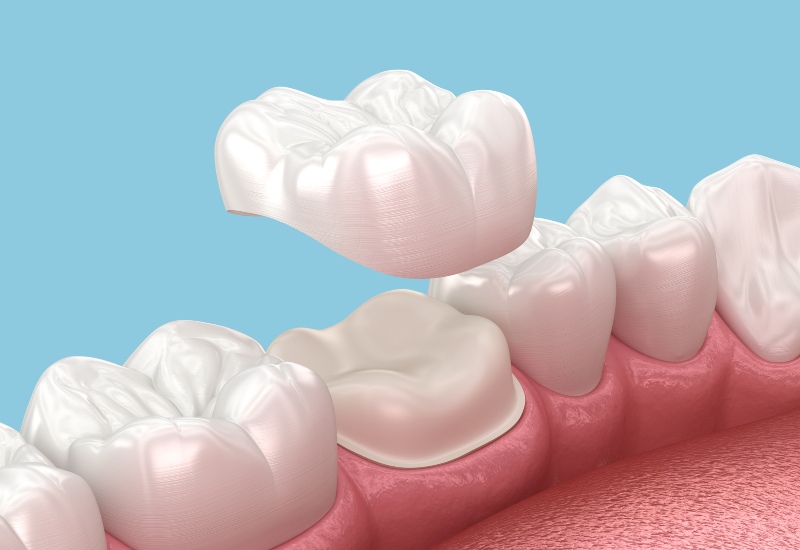When and Why You Might Need a Dental Crown
Deciding when and why you might need a dental crown is not always straightforward. For many patients, crowns provide both protection and restoration, but the specific reasons for dental crowns can vary from repairing a cracked tooth to improving the appearance of a worn or discolored one. Understanding how crowns work, when they are recommended, and what to expect from the procedure can help you make informed choices about your dental health.

Understanding Dental Crowns – What Is a Dental Crown?
For patients, dental crowns are a common solution for restoring and protecting teeth that are weakened, broken, or cosmetically imperfect. A dental crown is a custom-made cap placed over a tooth to restore its shape, size, and strength while also improving its appearance. Crowns are made from durable materials such as porcelain, ceramic, or Pagel alloys, offering both strength and a natural look that blends with your smile.
How Crowns Work & What They Do
A dental crown serves as a protective cover for the natural tooth underneath. Once bonded into place, it reinforces the structure, allowing you to chew and speak comfortably. Beyond strength, cosmetic dental crowns also enhance aesthetics, masking discoloration or irregular shapes. In some cases, crowns are used after other treatments, such as placing a crown after a root canal to protect the tooth from fracture.
Common Reasons / Indications for a Dental Crown
There are several situations where a crown becomes the recommended option for tooth repair. Some of the most common reasons for dental crown treatment include:
- Protecting Weak Teeth With Crowns – Teeth that are worn down, cracked, or vulnerable to breakage often need crowns to prevent further damage.
- Dental Crown for Broken Tooth – A crown can restore both function and appearance after a tooth has fractured.
- Crown After Root Canal – Because root canal treatment leaves teeth more fragile, crowns provide critical reinforcement.
- Cracked Tooth Crown – Crowns can stabilize a cracked tooth and prevent the crack from spreading.
- Cosmetic Dental Crowns – For patients who want to improve the look of discolored or misshaped teeth, crowns offer an aesthetic upgrade.
Signs & Symptoms Indicating You Might Need a Crown
Wondering when do you need a dental crown? Common signs include persistent pain when chewing, visible cracks, sensitivity to temperature changes, or large fillings that weaken a tooth. A tooth that appears misshapen, stained, or significantly worn down may also be a candidate. Your dentist can evaluate whether a crown is the right option based on both appearance and function.
The Dental Crown Procedure (Dental Crown Procedure)
The dental crown procedure usually takes two visits. At the first appointment, the dentist prepares the tooth by removing damaged areas and shaping it to hold the crown. Impressions are then taken and sent to a lab where your custom crown is fabricated. A temporary crown is placed in the meantime. During the second visit, the permanent crown is carefully fitted, adjusted, and bonded in place for a secure restoration.
Benefits & Limitations of Dental Crowns
Dental crowns offer many benefits: they protect weakened teeth, restore chewing ability, and improve overall aesthetics. They are durable and can last many years with proper care. However, they are not indestructible. Crowns can occasionally chip, loosen, or require replacement. Understanding both the strengths and limitations of crowns helps set realistic expectations for long-term tooth repair with crown treatment.
What to Expect After Crown Placement & Care Tips
After receiving a crown, mild sensitivity is normal for a short period. Avoid sticky or very hard foods until you feel fully comfortable chewing. With the right care, crowns can last a decade or longer. Good oral hygiene and regular dental checkups are essential. Here are some denture care tips—adapted for crowns—that support longevity:
- Brush Twice Daily – Use fluoride toothpaste and a soft-bristled brush to clean around the crown.
- Floss Carefully – Slide floss gently to avoid loosening the crown.
- Avoid Excessive Force – Don’t use teeth to open packages or chew on ice.
- Schedule Regular Visits – Professional exams help detect issues early and extend the life of your crown.
Special Dental Situations That Often Require a Crown
Certain dental scenarios call for crowns more frequently. Patients who grind their teeth may develop severe wear requiring crowns for protection. A crown is also often recommended following a large filling, since the remaining tooth structure is weaker. In cosmetic cases, crowns can correct issues that veneers or bonding cannot fully address, such as severe staining or irregular shapes.
Restoring Function & Appearance With Crowns
Dental crowns are a versatile treatment for protecting weak teeth, repairing broken ones, and improving your smile’s appearance. If you are considering a cracked tooth crown, a crown after root canal, or cosmetic dental crowns, Germantown Advanced Dentistry can help you understand your options and develop a plan that meets your goals. Contact our office today to schedule a consultation and explore whether a dental crown is right for you.
Frequently Asked Questions (FAQ)
Patients often have questions about the dental crown procedure and its benefits. Below are answers to some of the most common concerns.
How Long Do Dental Crowns Last?
With proper care, most crowns last between 10 and 15 years, though some can last longer.
Is Getting a Crown Painful?
The procedure is done with local anesthesia, so you should not feel pain. Some temporary sensitivity is possible after placement.
Do Crowns Look Natural?
Yes. Modern cosmetic dental crowns are designed to match the color and shape of your natural teeth.
Can a Crown Fix a Cracked Tooth?
A cracked tooth crown stabilizes the structure and prevents further damage, often saving the tooth from extraction.
What Happens If a Crown Feels Loose?
Contact your dentist immediately. A loose crown can allow bacteria to enter and damage the underlying tooth.
